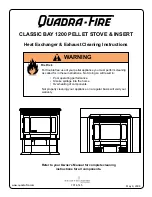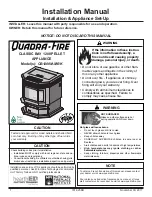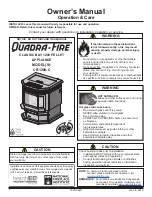
Display is Flashing “E5”
Possible Causes
Possible Remedies: (Unplug stove first when possible)
The stove automatically flashes "E5" when turned on
The T-stat sensor has come unplugged form the control board.
Check to see if the sensor is unplugged. If the sensor is not
unplugged then the sensor is damaged or has a short. If the
sensor is damaged or has a short it will need to be replaced.
The hopper is out of Pellets.
Refill the hopper.
The hopper safety switch has failed or hopper is open.
When operating the unit, be sure the hopper lid is closed so
that the hopper safety switch will activate. Check the wires
leading from the hopper safety switch to the control panel
and auger motor for secure connections. Use a continuity
tester to test the hopper safety switch; replace if necessary.
The auger shaft is jammed.
Start by emptying the hopper. Then remove the auger
motor by removing the auger pin. Remove the auger shaft
inspection plate in the hopper so that you can see the auger
shaft. Gently lift the auger shaft straight up so that the end of
the auger shaft comes up out of the bottom auger bushing.
Next, remove the two nuts that hold the top auger biscuit in.
Then rotate the bottom end of the auger shaft up towards
you until you can lift the shaft out of the stove. After you have
removed the shaft, inspect it for bent flights, burrs, or broken
welds. Remove any foreign material that might have caused
the jam. Also, check the auger tube for signs of damage such
as burrs, rough spots, or grooves cut into the metal that could
have caused a jam.
The auger motor has failed.
Remove the auger motor from the auger shaft and try to run
the unit. If the motor will turn the shaft is jammed on something.
If the motor will not turn, the motor is bad.
Stove Feeds Pellets, But Will Not Ignite
Possible Causes
Possible Remedies: (Unplug stove first when possible)
Air damper open too far for ignition.
Push the air damper in closer to the side of the stove for startup.
In some situations it may be necessary to have the damper
completely closed for ignition to take place. After there is a
flame, the damper can then be adjusted for the desired feed
setting.
Blockage in igniter tube or inlet for igniter tube.
Find the igniter housing on the backside of the firewall. The
air intake hole is a small hole located on bottom side of the
housing. Make sure it is clear. Also, look from the front of the
stove to make sure there is not any debris around the igniter
element inside of the igniter housing.
The burnpot is not pushed completely to the rear of the
firebox.
Make sure that the air intake collar on the burnpot is touching
the rear wall of the firebox.
Bad igniter element.
Put power directly to the igniter element. Watch the tip of the
igniter from the front of the stove. After about 2 minutes the tip
should glow. If it does not, the element is bad.
The control board is not sending power to the igniter.
Check the voltage going to the igniter during startup. It should
be a full current. If the voltage is lower than full current, check
the wiring. If the wiring checks out good, the board is bad.
-
21
-
















































